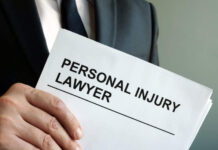Accidents can happen in the blink of an eye, often leaving individuals with physical injuries, emotional distress, and financial burdens. Personal injury law is designed to protect the rights of those who have been harmed due to the negligence or intentional actions of others. In this comprehensive guide, we’ll delve into the key aspects of personal injury law, helping you gain a better understanding of your rights, responsibilities, and the steps to take if you find yourself in such a situation.
What is Personal Injury Law?
Personal injury law encompasses a branch of civil law that allows individuals who have suffered harm to seek compensation from those responsible for their injuries. The primary goal of personal injury law is to provide victims with a means to recover their losses and move forward after an accident.
Types of Personal Injury Cases
Personal injury cases cover a wide range of incidents. Some common types include:
- Car Accidents: When a person is injured in a collision due to another driver’s negligence.
- Slip and Fall Accidents: Injuries resulting from hazardous conditions on someone else’s property.
- Medical Malpractice: Cases where healthcare professionals’ negligence leads to patient harm.
- Product Liability: Injuries caused by defective products.
- Workplace Accidents: Injuries that occur while on the job.
- Dog Bites: Injuries caused by a dog’s aggressive behavior.
- Assault and Battery: Intentional harm caused by another person.
- Wrongful Death: Cases where a person’s death results from another party’s negligence or intentional actions.
Key Concepts in Personal Injury Law
- Duty of Care: This refers to the legal obligation individuals and entities have to exercise reasonable care to prevent harm to others. For instance, drivers have a duty of care to operate their vehicles safely.
- Breach of Duty: If the responsible party fails to fulfill their duty of care, it’s considered a breach. For instance, a property owner failing to fix a hazardous condition that leads to a slip and fall.
- Causation: To hold someone liable, it must be proven that their breach of duty directly caused the injury. Establishing a clear link between the negligent action and the harm suffered is crucial.
- Damages: In personal injury cases, damages refer to the losses suffered by the victim. These can include medical expenses, lost wages, pain and suffering, emotional distress, and more.
Steps to Take After an Accident
- Seek Medical Attention: Your health should be the top priority. Seek medical care even if your injuries seem minor, as some conditions may not be immediately apparent.
- Document the Scene: If possible, gather evidence at the accident scene. Take photos, gather contact information from witnesses, and document any visible injuries.
- Report the Incident: For accidents that occur on someone else’s property or involve another party, report the incident to the relevant authorities, such as the police or property owner.
- Preserve Evidence: Keep records of medical treatments, expenses, and any communication related to the incident. These documents will be valuable when building your case.
- Consult a Personal Injury Lawyer: If you believe your injuries were caused by someone else’s negligence, consult a personal injury lawyer. They can evaluate your case, explain your legal options, and guide you through the process.
Working with a Personal Injury Lawyer
Personal injury lawyers play a critical role in helping victims navigate the legal process. They offer expertise in:
- Legal Advice: Personal injury lawyers provide knowledgeable guidance tailored to your situation.
- Investigation: They gather evidence, interview witnesses, and build a strong case on your behalf.
- Negotiation: Lawyers negotiate with insurance companies to ensure you receive fair compensation for your injuries.
- Representation: If a fair settlement isn’t reached, personal injury lawyers can represent you in court to seek compensation through a trial.
Conclusion
Understanding personal injury law is essential for protecting your rights and seeking the compensation you deserve after an accident. Whether you’re injured in a car accident, slip and fall incident, or any other type of accident caused by negligence, consulting with an experienced personal injury lawyer can help you navigate the complexities of the legal system and work towards a favorable resolution. Remember, you don’t have to go through this process alone – legal professionals at Dunk Law Firm Services are there to support you every step of the way.
Read Also: Palm Beach During Spring Break: Traffic, Accidents, and What You Need to Know



































































